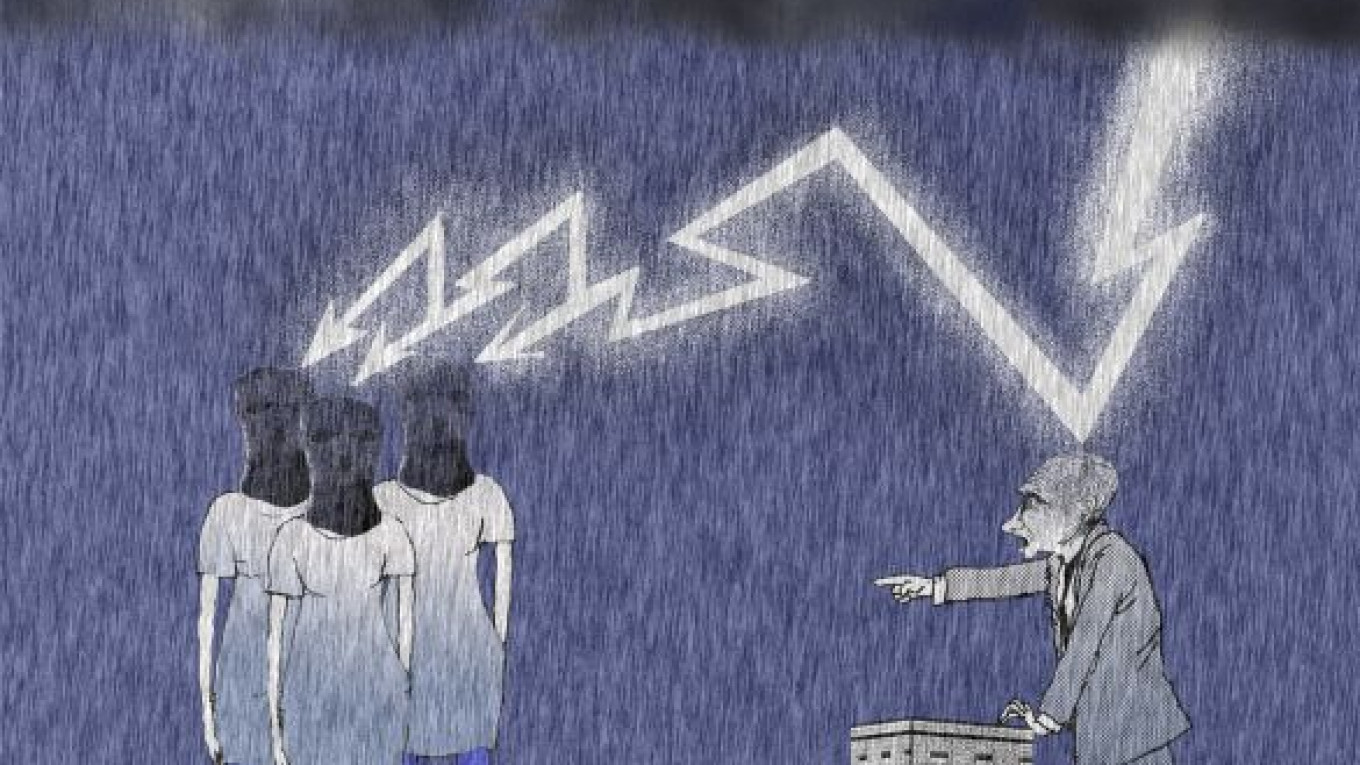August is often an unlucky month in Russia, particularly President Vladimir Putin's Russia. Submarines have sunk, neighbors have been invaded, and forests have burned out of control. But this August, the crisis was purely man-made — indeed, it was made by one man. The conviction of three members of the agitprop punk-rock group Pussy Riot for "hooliganism motivated by religious hatred" has turned the three young women into an international cause celebre.
On Feb. 12, five members of the group tried to stage a performance, later described as a "punk prayer" in Moscow's Christ the Savior Cathedral.The stunt lasted for 41 seconds, at which point security personnel expelled the performers. But their visit to Russia's largest church was not in vain. Footage of five women, dressed in bright dresses and balaclavas while jumping in front of the altar, circulated widely on the Internet.
Their song accused Patriarch Kirill of kowtowing to the government and advised him to believe in God, not Putin. The song's refrain — ""Mother of God, cast Putin out!" — incited the wrath of both church and state. So retribution was certain. The word "blasphemy" was used more and more frequently. On March 3, the day before the presidential election, two members of the group, Nadezhda Tolokonnikova and Maria Alyokhina, were arrested. A third, Yekaterina Samutsevich, followed them to prison 12 days later.
Initially, Pussy Riot's troubles attracted little attention, but the hate campaign orchestrated by Orthodox activists and the threat of a seven-year prison sentence for the women turned the tide. Moscow liberals, initially treating the performance as silly, saw the threat of prison as inappropriate and the proceedings of the court as Kafkaesque and demented. The case also attracted attention in the West. Dozens of pop stars, from Pete Townsend and Paul McCartney to Madonna, rallied in support of the women.
Of course, Pussy Riot could hardly be classified as musicians. They were more interested in creating visual images. Both the feminist chants and the primitive chords were secondary to the spectacle. In a sense, Pussy Riot created a simulacrum of a punk-rock group, a piece of performance art about anonymous protest musicians being mistaken for real musicians by real musicians.
Some of the punk-feminists' militant accusers saw in their choice of Christ the Savior a diabolical plot against not only Orthodoxy, but also Russia itself. They repeated ad nauseam that the cathedral was constructed as a monument to the victory over Napoleon, the 200th anniversary of which is being commemorated this year. But they neglected to mention that it was destroyed, on Stalin's order, in 1931 to make way for a gigantic Palace of Soviets, which was never constructed. In 1960, the long neglected pit for the palace's foundation was transformed into an open-air swimming pool.
In 1994, three years after the Soviet Union's collapse, reconstruction of the cathedral began. President Boris Yeltsin's main ideological project, completed in 2000, aimed to undo symbolically the years of Communist rule and return Russia to its past. But the new-old church could not turn back time. If it became a symbol, it was of Putin's new Russia, with its mix of jingoistic nationalism and state religion. Therefore, any attack on a monument embodying the unity of church and state under Putin could not go unpunished.
The Pussy Riot trial was, of course, a travesty of justice, with the prosecution quoting canons of the Quinisext Council, which took place in Constantinople in 692, under Byzantine Emperor Justinian II. The supposed victims of the Pussy Riot "prayer" — security guards and other church personnel — testified that they could not sleep after witnessing the performance. Larisa Pavlova, the supposed victims' lawyer, averred: "Feminism is a deadly sin."
The political character of the performance was flatly ignored, and the verdict of the judge, who sentenced the trio to two years in prison, proved to be the show trial's scandalous denouement. According to the presidential human rights council, Tolokonnikova, Alyokhina and Samutsevich were punished for a crime that does not exist — and therefore is not punishable — under Russian legislation. The council quoted St. Paul: "I had not known sin, but by the law: for I had not known lust, except the law had said."
What we have witnessed since August is the latest battle in a Kulturkampf between Russia's liberal intelligentsia and conservative, often fundamentalist, believers in the unity of the Orthodox Church and the Kremlin. By punishing Pussy Riot, Putin has staked his presidency on an eventual conservative victory. Which side the Holy Virgin will take remains to be seen.
Konstantin Akinsha is an art historian and contributing editor to ARTnews magazine. ® Project Syndicate
Related articles:
A Message from The Moscow Times:
Dear readers,
We are facing unprecedented challenges. Russia's Prosecutor General's Office has designated The Moscow Times as an "undesirable" organization, criminalizing our work and putting our staff at risk of prosecution. This follows our earlier unjust labeling as a "foreign agent."
These actions are direct attempts to silence independent journalism in Russia. The authorities claim our work "discredits the decisions of the Russian leadership." We see things differently: we strive to provide accurate, unbiased reporting on Russia.
We, the journalists of The Moscow Times, refuse to be silenced. But to continue our work, we need your help.
Your support, no matter how small, makes a world of difference. If you can, please support us monthly starting from just $2. It's quick to set up, and every contribution makes a significant impact.
By supporting The Moscow Times, you're defending open, independent journalism in the face of repression. Thank you for standing with us.
Remind me later.






